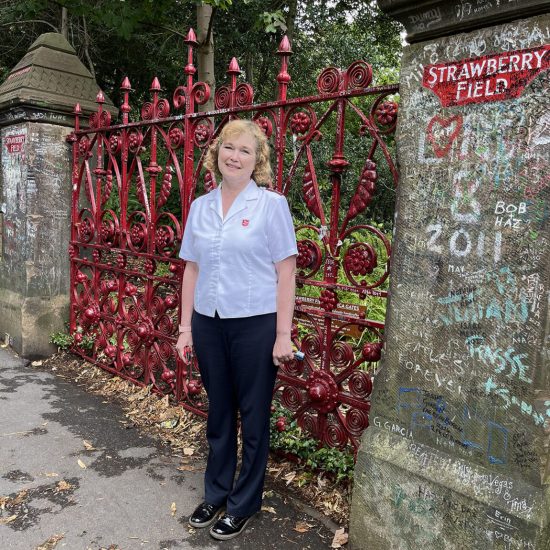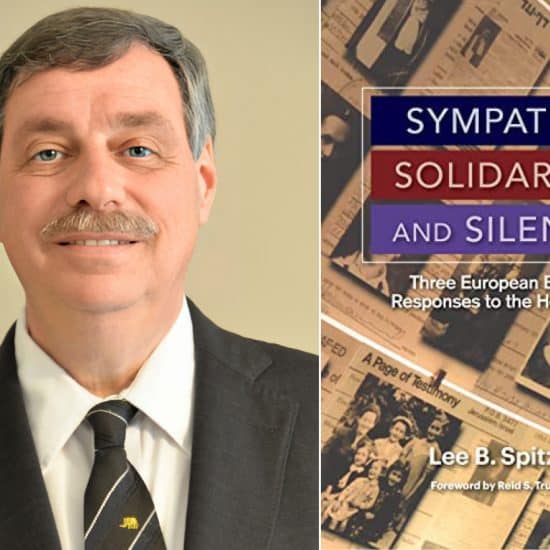CHALFONT ST. PETER, England — Two by two, men and women of several denominations clustered near the worship stage, on their knees or standing with arms outstretched and praying for one another’s needs.
Though it continues to struggle, the evangelical church in Great Britain is alive and active — and a small network of pastors and leaders believes working together will strengthen it.

Calvin Brown (above left), director of missions, Concord Baptist Association, invites Catalyst participants in Great Britain to a meeting in Jefferson City, Mo., in June. Malcolm Duncan (above right), pastor of Gold Hill Baptist Church in Chalfont St. Peter and the Catalyst leader for Great Britain looks on.
|
Participants in Catalyst: An Open Mission Movement have worked since it formed in November 2011 to “wrestle” with Scripture, to work together and to engage with the community in mission and culture. Their aim has been to encourage each other and to share resources and ideas — and to continue to proclaim that God wants to work through the church to reach the world.
Currently, the church in Great Britain is just about “holding even” — traditional, mainline denominations continue to decline, while the Armenian Orthodox Church and more contemporary groups such as New Frontiers are growing. Only about 8 percent of that nation’s population attends church services.
“We must recognize this is God’s church, not ours,” declared Malcolm Duncan, leader of the national movement.
Sharing at a daylong conference March 19 at Gold Hill Baptist Church in Chalfont St. Peter in England, Duncan added, “We must be seeking to build God’s church with him, not for him…. We are not simply social reformers.”
He emphasized that believers must look to Christ rather than to what they can do themselves. “Jesus wants his church back. It’s not your church. It’s not my church,” Duncan said.
Matt Summerfield, pastor of Hitchin Christian Center in Hitchin, England, and director of Urban Saints, challenged listeners to consider that diversity plus unity plus tenacity equals church maturity and health.
He reminded them that believers are the body of Christ and that while each is different, everyone has a special place or practice to contribute. First Corinthians 12 applies to individuals and to congregations, he said. The church — with a capital “C” — is made up of unique churches — with a lowercase “c” — which are made of unique individuals, he explained.
Summerfield called participants to ask how their churches are uniting with, cooperating with and working together with other congregations. He reminded them that one church is the eye, another the ear, another a different body part God uses to create the whole.
Each person and congregation is called to hold on, to make every effort to keep the church in the bonds of peace, he said. “We must accept and value one another,” he added, noting that doing so is hard in local congregations and between churches.
“But God makes the whole body fit together perfectly,” Summerfield said.
The one-day event, held twice each year, focuses on a topic or theme and provides training opportunities for participants. It also offers fellowship and networking — and bonding and the sense of unity many believe Christ calls for in John 17.
The network is slowly spreading across Great Britain, with churches working together in Scotland and congregations in northeast England thinking about it. Local networks meet monthly.
“It’s the power of partnership,” noted David Randall of a nondenominational church in Marlow. Catalyst provides sharing and networking, opportunities to develop friendships and accountability to people outside the local congregation, he added.
“It’s an opportunity to look at the same issue and tackle it. That’s far more powerful than doing it alone,” Randall said.
By linking with others, “you recognize how God is moving in different churches…as you hear of the different things going on,” noted Tony Reynolds of Gold Hill. “The method of Jesus is there is no method…there is no set way” to be the church.
Leaders are asking God to expand the network and are currently exploring some possibilities in the United States. Because the word catalyst has become a bit of a buzzword in the nearly three years the network has existed, the group plans to change the name to The Community Church Network: A Catalyst for Mission.
Regardless of how much it might grow, the heart of the network remains relational. To be missional, believers must be relational — not only with those they seek to serve, but also with their brothers and sisters in Christ.
“It’s an opportunity for relational networking,” noted Steve Rayner of Gold Hill. “We’re all still on the journey. It’s exciting times.”




